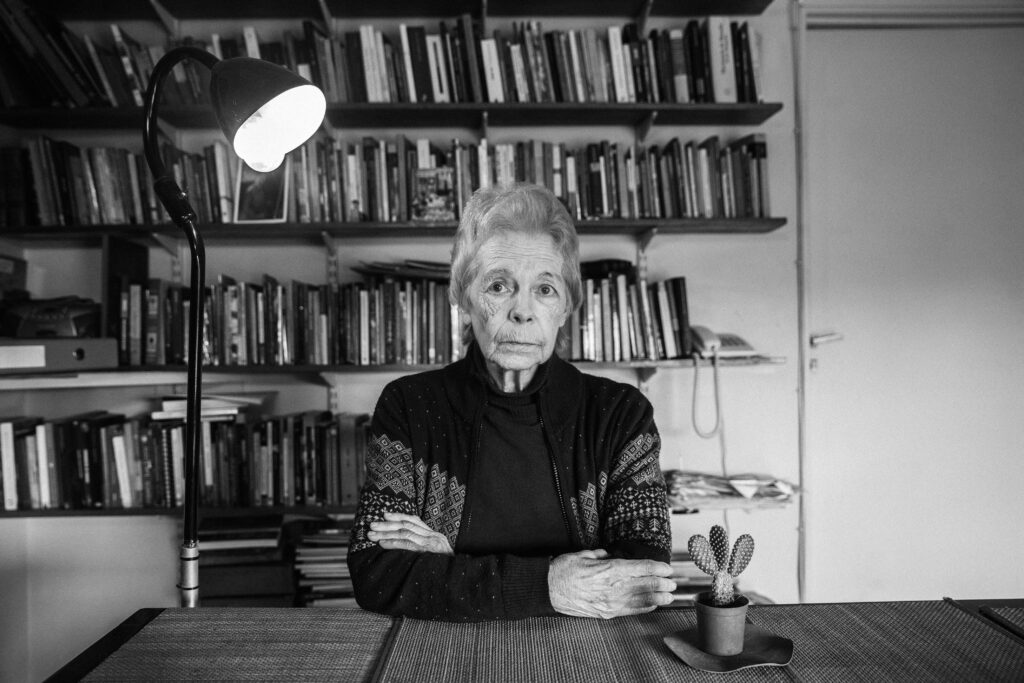Good Manners

Hebe Uhart. Photograph by Nora Lezano.
Hebe Uhart had a unique way of looking—a power of observation that was streaked with humor, but which above all spoke to her tremendous curiosity. Uhart, a prolific Argentine writer of novels, short stories, and travel logs, died in 2018. “In the last years of her life, Hebe Uhart read as much fiction as nonfiction, but she preferred writing crónicas, she used to say, because she felt that what the world had to offer was more interesting than her own experience or imagination,” writes Mariana Enríquez in an introduction to a newly translated volume of these crónicas, which will be published in May by Archipelago Books. At the Review, where we published one of Uhart’s short stories posthumously in 2019, we will be publishing a series of these crónicas in the coming months. Read others in the series here.
Yesterday I was riding the 92. The bus was half-empty and a woman of about sixty or seventy caught my eye. It was difficult to get a sense of her age, or her social class. Could she be poor? No, but she didn’t seem rich either, nor did I pick up on any of that visible effort the middle class put into their appearance: dressing neatly, in complementary colors. Her clothes reminded me, more than anything, of someone trying to go incognito. She didn’t come off as a housewife; I decided she had the look of a government inspector. She sat down beside me.
“Señora, I’m getting off at Pueyrredón,” I said, so I wouldn’t have to get up if her stop was before mine.
“Works for me,” she said, “I’m getting off at Laprida.”
She settled in beside the window as though she owned the seat and was allowing me to sit next to her. The bus driver was a young, pudgy guy, but agile. He drove expertly and very fast, which I noticed when we passed another 92 (they tend to run two or three at a time, the drivers amusing themselves by racing). He changed gears smoothly, as though he’d been born at the steering wheel. “Whoa!” he said suddenly. I asked what happened. My neighbor, looking straight ahead at nothing in particular, said, “She shouldn’t have passed on the right.”
Her tone was cold and dry and I felt ignorant. I hadn’t noticed anyone crossing.
“She pulled it off,” the driver said. “What a brave girl—sometimes girls are brave.”
I didn’t know what to say, because it isn’t every day that a bus driver speaks. I also didn’t understand why the girl had been brave for crossing.
“Yes,” said my neighbor the inspector, “But she could end up in a tree.”
This sounded a lot like a prophecy, or a desire that the girl end up in a tree. The driver cracked a smile—he found something funny in the statement. A woman got on the bus; she greeted the driver, he returned the greeting. I wanted to feel worthy of my seat, so I said something about their civility—I wanted the inspector woman to accept me. I referred to their greeting as an old-fashioned custom.
“It’s good manners,” she said, without looking at me.
It seemed that good manners, to her, were not about doing polite things to make life more pleasant but were things of divine origin. The driver spoke again: “There’s a traffic jam. Someone double-parked.”
“That’s not allowed,” she said.
He spoke to her even though he didn’t care much about good manners. I would never have known where and how to park.
“There it is. Over there, at Bazterrica Hospital,” he said.
She replied yet again. I felt a growing need to say something to him, partly to appear less ignorant and partly to take advantage of the rare opportunity to talk to a bus driver. So I said something that I immediately regretted: “Sir, do you like it when people greet you?”
I regretted asking because I figured the woman was going to dislike my question.
“When it’s one or two of them, have at it, but when it’s about a hundred I start thinking they want something,” he said.
“It’s good manners,” the woman insisted.
I wanted to ask the driver another question so I could join their conversation, but even as the questions formed in my mind, they already seemed trivial. Despite knowing I was headed toward being ostracized, I said, “How often do you take this route every day?”
“Four times.”
He answered me curtly, even though he wasn’t the curt type. Evidently, he was speaking only with her. I had another question up my sleeve: Where did the 92 come from and where was it going? I genuinely would have liked to know. But it seemed so irrelevant (and my seatmate’s silence ever so deafening) that I kept quiet. Her silence made me feel like I was six or seven years old again, playing with a nutty girl I knew back then: every time I went to do something—swing in the hammock or take off running—the girl would stomp her foot angrily and say “No!” It made me feel like I was perpetually in the wrong. Everything I did or stood for was—to that girl—bad. But things were different now. I no longer felt thrashed, like a wind-beaten plant, by that uncomfortable feeling. I had built up my defenses. When we got to Pueyrredón, I avoided every possible show of good manners: I got off the bus without saying goodbye to either of them.
Anna Vilner’s translation of “Good Manners” will appear in a forthcoming collection of Hebe Uhart’s crónicas, A Question of Belonging, to be published by Archipelago Books in May 2024. The original Spanish version was collected in Uhart‘s Crónicas completas, published by Adriana Hidalgo.
